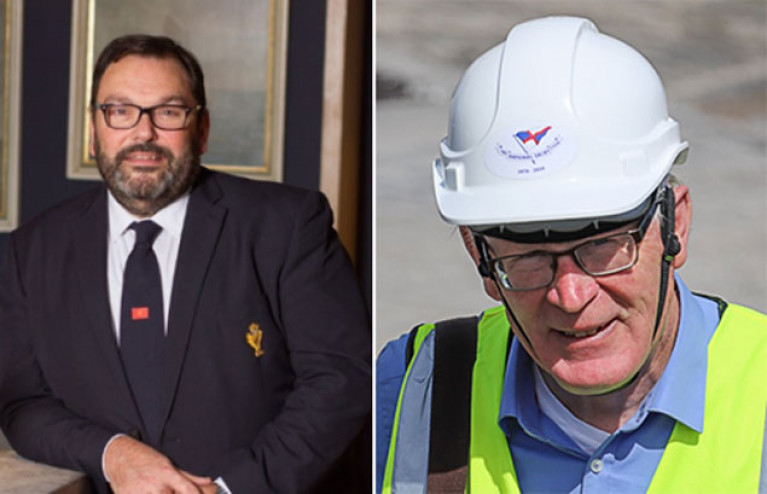Displaying items by tag: Martin McCarthy
Colin Morehead & Martin McCarthy are "Sailors of the Month (Services to Sailing)" for August
It is unusual to have two leading figures sharing the "Sailor of the Month (Services to Sailing)" award. And it surely unique when one is Admiral of the world's oldest yacht club, the Royal Cork at Crosshaven, in its Tricentenary Year, while the other is Commodore of the National YC in Dun Laoghaire as it marks its 150th Anniversary.
Yet both have shared an indomitable spirit in encouraging and leading their members in whatever sailing and club activity is possible through the COVID-19 crisis, and both, in turn, have seen their members support with a sense of responsible community which is a credit to both clubs, and to Irish sailing generally.
This was celebrated by a very special occasion on the morning of Saturday, August 22nd, when a small but select and carefully-choreographed gathering, hosted by Commodore Martin McCarthy at the National YC, marked the imminent start of the Fastnet 450 Race to the Fastnet Rock and Crosshaven. Afloat and ashore, it was to be a very special event which cemented the links between the clubs and their senior flag officers, and provided Irish sailing with a much-needed highlight in a difficult year.
Admiral Morehead attended from Cork – as did his predecessor Thomas G French for the first such race 160 years ago, in 1860 - and there too was the new Cathaoirleach of Dun Laoghaire-Rathdown County Council, Councillor Una Power, to show her support for the increasingly important role sailing fulfills in the harbour.
 ISORA Chairman Peter Ryan and SCORA Commodore Johanna Murphy at the National YC
ISORA Chairman Peter Ryan and SCORA Commodore Johanna Murphy at the National YC
Also, there were former NYC Commodore and current ISORA Chairman Peter Ryan - whose organisational support and loan of Yellowbrick Trackers was vital to the success of the race – and current SCORA Commodore Johanna Murphy of Cobh who, together with RCYC Rear Admiral Annamarie Murphy and Mark Mansfield, formed the core trio that put this very successful pop-up race into place.
As for the Guests of Honour, they emphasised the long and healthy links between the two clubs. One was Clayton Love Jnr, who amalgamated the Royal Cork and Royal Munster in 1967 to give it full strength for its Quarter Millennium fifty years ago, when he served as Admiral RCYC while at the same time being President of the Irish Yachting Association, which he guided into national authority status from being the Irish Dinghy Racing Association.
 At the National YC for the start of the Fastnet 450 were Clayton Love Jnr – Admiral of the Royal Cork YC for its Quarter Millennial Celebrations in 1969-70, and founding President of the Irish Yachting Association – with the National Yacht Club's Carmel Winkelmann, who in the 1960s was involved in founding the NYC's Junior Section, and then played a major national role in junior training for the IYA.
At the National YC for the start of the Fastnet 450 were Clayton Love Jnr – Admiral of the Royal Cork YC for its Quarter Millennial Celebrations in 1969-70, and founding President of the Irish Yachting Association – with the National Yacht Club's Carmel Winkelmann, who in the 1960s was involved in founding the NYC's Junior Section, and then played a major national role in junior training for the IYA.
And the other was the National Yacht Club's own indomitable Carmel Winkelmann, who in the 1960s led the way in setting up the pioneering junior training section in the National YC, and from that went on to play a major national role in Junior Training through the IYA.
It may have been a socially-distanced gathering of very restricted numbers, but in national sailing terms – both current and historical - it certainly packed formidable firepower, and well illustrates why we feel honoured to celebrate Colin Morehead and Martin McCarthy as our "Sailors of the Month (Services to Sailing)" for August 2020.






























































